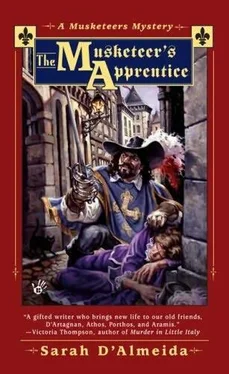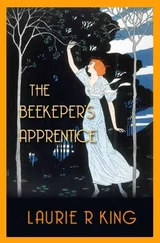Sarah D'Almeida - The Musketeer's Apprentice
Здесь есть возможность читать онлайн «Sarah D'Almeida - The Musketeer's Apprentice» весь текст электронной книги совершенно бесплатно (целиком полную версию без сокращений). В некоторых случаях можно слушать аудио, скачать через торрент в формате fb2 и присутствует краткое содержание. Жанр: Триллер, на английском языке. Описание произведения, (предисловие) а так же отзывы посетителей доступны на портале библиотеки ЛибКат.
- Название:The Musketeer's Apprentice
- Автор:
- Жанр:
- Год:неизвестен
- ISBN:нет данных
- Рейтинг книги:4 / 5. Голосов: 1
-
Избранное:Добавить в избранное
- Отзывы:
-
Ваша оценка:
- 80
- 1
- 2
- 3
- 4
- 5
The Musketeer's Apprentice: краткое содержание, описание и аннотация
Предлагаем к чтению аннотацию, описание, краткое содержание или предисловие (зависит от того, что написал сам автор книги «The Musketeer's Apprentice»). Если вы не нашли необходимую информацию о книге — напишите в комментариях, мы постараемся отыскать её.
In a search for his apprentice's killer, Musketeer Porthos rallies his friends to discover who was responsible, pursuing the truth even as he puts his own life in danger.
The Musketeer's Apprentice — читать онлайн бесплатно полную книгу (весь текст) целиком
Ниже представлен текст книги, разбитый по страницам. Система сохранения места последней прочитанной страницы, позволяет с удобством читать онлайн бесплатно книгу «The Musketeer's Apprentice», без необходимости каждый раз заново искать на чём Вы остановились. Поставьте закладку, и сможете в любой момент перейти на страницу, на которой закончили чтение.
Интервал:
Закладка:
A girl of about ten, stick thin, with dark eyes and lank brown hair came out of the shadows. She was attired in a clean, probably third- or fourthhand dress and other than her thinness could have been the couple’s daughter. But Athos doubted very much that any child of the couple would have been allowed to grow so thin. Also, the woman behind the bar looked on the girl as though she were something that had crawled from beneath a rock, and moved her lips as though muttering something under her breath.
The musketeers and D’Artagnan sat at the nearest unoccupied table, and the girl approached, hesitantly. Athos’s phobia towards women did not apply yet at this age, when girls were more children than anything else. He felt towards the girl as he felt towards boy children the same age-as he would view something young and in distress. A vague feeling that he should protect her crept over him, and his voice was kinder than it would be to any adult as he said, “Hello, Amelie.”
He fumbled in his almost empty purse-it was getting so tallow candles would soon look good for dinner-and brought out a coin, which he tossed in the middle of the table and to which Aramis, silently, added two more. “Get us what wine those will buy, would you? A mug for each of us.”
The girl bowed and scrambled towards the bar and the woman behind it. Soon they could hear her whisper and hear the woman answer in harsh tones.
Athos ignored the exchange. No matter how tempted, it was neither possible nor desirable for him to save every stray waif in Paris. For one, there was a good chance he’d end up killed if he tried. And for another, his duty was somewhat more immediate. He’d sworn to serve king and country. And, in this particular case, he’d sworn to defend Monsieur de Treville, and to find out who’d killed this boy so that the boy’s death could not be used in a plot against the musketeers. Then there was his loyalty to his friends, and to Porthos, most of all, who was suffering from shock and grief at the death of the boy he’d considered some sort of apprentice.
“Holá, host,” Athos said, towards the tavern keeper.
The round-cheeked man looked up from the table which, to own the truth, he seemed to be only pretending to polish while he kept an eye on the four newcomers.
“Yes, Monsieur Musketeer?” he said, looking up, his hand still on the rag with which he’d been polishing the already gleaming table with some sort of oil he kept in a clear bottle by his side.
“Could you come here for a moment,” Athos asked, giving his whole countenance, his whole speech that tone of command that he knew other people resented but obeyed in equal measures. Porthos called it putting on his noble airs, and Aramis looked on enviously, whenever Athos did this, as though he wished he, too, could command people by assuming a natural superiority of look and manner. D’Artagnan merely watched, which was perhaps the boy’s greatest quality.
The tavern keeper hesitated and glanced towards his wife. But as his wife was very busy setting cups of wine on a broad tray, he shrugged and approached them.
“How may I help you?” he asked.
“You may tell us if you know this boy,” Athos said and pulled, from his sleeve, the picture of Guillaume as drawn by Aramis.
There was recognition in the man’s eyes, as soon as they fell upon the drawing. Then there was a frowning, momentary look, as though the man were considering whether he could lie and have his lie believed. He looked up and, in Athos’s dark blue eyes must have read the certainty that his first expression had been detected.
The man scrunched the rag he still held in his right hand, and frowned, then sighed. “It’s Guillaume,” he said.
“Guillaume who?” Porthos asked.
The man looked at him and opened his mouth, then closed it again. He shrugged. “Just Guillaume, sir. He was born in our stables and I guess he grew up here. I never heard of his having a family name.”
“His… mother’s, perhaps?” Athos asked.
The man shrugged. “His mother was a…” He looked at Amelie who approached with a tray laden with mugs. She sagged under the burden which was clearly too heavy for her. The tavern keeper’s eyes softened, and he looked back at the table. “His mother arrived here with child. She came, she said, to find her fiancé. She never found him. She stayed and helped serve.” He shrugged. “Amelie was born a few years later, and then a few more years later, Pigeon- as the clients called her-their mother, died of a fever. We let the boy and the girl stay in the stable, but other than that, know nothing about them.” While Amelie put the mugs of wine on the table, the man gave Athos as clear and untroubled a glance as ever man bent upon customer. “Has the boy done anything that has got him in trouble?”
“No,” Athos said, and that much was true, since Guillaume could now be said to be past all trouble or at least all trouble a mortal body could find. He thought fast. If he claimed he knew the boy’s father he was only likely to excite the curiosity and perhaps the venality of the tavern keeper. Easier, much easier to claim the boy had been trying to find better employment. “It’s only,” he said, “that the boy talked to my servant Grimaud, some time ago. It seems he was interested in being a fighting man’s servant himself. At the time I didn’t know anyone looking for a servant and I didn’t have enough employment for him, myself. But since then I’ve heard of a young musketeer who comes from a house with some… some substance behind it. He has a servant already, but wants someone to look after his horses, and I thought perhaps…” Athos rallied. Since the man didn’t know the boy was dead and didn’t seem to be concerned about him, there was little point in telling him of the event. Easier, much easier, to find out something about the boy’s life from this man and maybe from that deduce the killer. Easier to find if the boy might have been in the employ of someone else-like the Cardinal. “Is he about?” Athos asked, and saw a flinch from Porthos who sat catercorner from him on the table and for just a moment feared that Porthos would remind him the boy was dead.
But Porthos, strangely and unaccountably, seemed all concentrated on what the girl, Amelie was doing, walking back with the tray, setting it on the bar. This was unfathomable since Porthos didn’t usually even notice children much. He probably hadn’t paid any attention to a child since the time he’d adopted Boniface under the guise of hiring him, and made him into the more bellicose-sounding Mousqueton, and the day that Guillaume had asked for instruction in the plying of a sword.
But perhaps Guillaume had made Porthos think about all children. Now and then, in the privacy of his own thoughts, Athos, who had left thirty behind, thought of an heir-someone who would inherit his domain and his title after his death. Unfortunately to beget an heir he’d need a woman. And Athos’s experience of women had neither qualified him to trust them nor to trust himself.
Athos looked back at the tavern keeper, who was looking at Porthos, also, with some concern. He now transferred his glance to Athos, “No, sir. I haven’t seen the scapegrace in some days…” He shrugged. “The thing is, you see, that he’s been talking for some time now about leaving my employ and finding himself a patron who is wealthier and better able to look after him. He’s not stupid, Guillaume. Cheeky, undisciplined and often infuriating, but not stupid.” He smiled a smile that made him seem more human. “He taught himself to read and write when he was very young, begging one letter of a customer, another off another. People taught him because he had winning ways. And so, he knows how to read and how to write, and he’s got ideas in his head… I don’t know what he means to do at any time.”
Читать дальшеИнтервал:
Закладка:
Похожие книги на «The Musketeer's Apprentice»
Представляем Вашему вниманию похожие книги на «The Musketeer's Apprentice» списком для выбора. Мы отобрали схожую по названию и смыслу литературу в надежде предоставить читателям больше вариантов отыскать новые, интересные, ещё непрочитанные произведения.
Обсуждение, отзывы о книге «The Musketeer's Apprentice» и просто собственные мнения читателей. Оставьте ваши комментарии, напишите, что Вы думаете о произведении, его смысле или главных героях. Укажите что конкретно понравилось, а что нет, и почему Вы так считаете.










